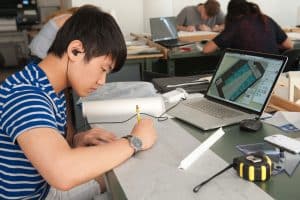Why Observational Learning is Essential for College Success: Insights From Educational Psychology
Observational learning, also known as social learning or modeling, is a cognitive process in which an individual learns by watching and imitating the behavior, attitudes, and outcomes of others. It is a form of learning that occurs through observation and does not require direct instruction or reinforcement.
It is essential for college success, as it allows students to acquire new knowledge, skills, and perspectives from a variety of sources, including peers, mentors, instructors, and real-world experiences. By observing and learning from others, students can develop critical thinking skills, enhance their social and emotional intelligence, and prepare for their future careers and life goals.
The purpose of this article is to explore the importance of observational learning in college success and provide insights from educational psychology that can help students and educators better understand and apply this powerful learning strategy.
We will examine the key concepts and components of this learning theory, its benefits in academic, social, and career contexts, and strategies for incorporating it into college learning environments.
By the end of this article, you will have a comprehensive understanding of its role in college success and practical tips for applying this learning strategy in your own lives.
What is the observational learning theory?
So, what is the observational learning theory? Also known as the “social learning theory” or “modeling theory,” it is a cognitive process that describes how individuals learn by observing the behavior, attitudes, and outcomes of others. It is a form of learning that occurs through observation and does not require direct instruction or reinforcement.

According to Albert Bandura, the father of observational learning theory, there are four key components of observational learning: attention, retention, reproduction, and motivation. These four components work together to enable learners to acquire new skills, knowledge, and behaviors by observing others.
Key Concepts and Components of Observational Learning
Attention
Attention is the first key component of observational learning, and it refers to the learner’s ability to focus on the behavior, attitudes, and outcomes of others. In order to learn through observation, learners must be able to pay attention to the behavior of the model and filter out distractions that could interfere with the learning process.
Retention
Retention is the second key component, and it refers to the learner’s ability to remember and store the information acquired through observation. Learners must be able to retain the information in their memory and retrieve it later when needed.
Reproduction
Reproduction is the third key component, and it refers to the learner’s ability to reproduce the observed behavior. This involves using the information stored in memory to guide behavior and perform the same actions as the model.
Motivation
Motivation is the fourth key component, and it refers to the learner’s drive to perform the observed behavior. Motivation can be influenced by a variety of factors, including the perceived relevance of the behavior, the perceived rewards and punishments associated with the behavior, and the learner’s self-efficacy beliefs.
What are the benefits of observational learning?
What are the benefits of observational learning? It can provide a wide range of benefits for students in college, including enhancing academic skills, social and emotional skills, and career and life skills.
Enhancing Academic Skills
It can be a powerful tool for improving academic performance in college. By observing and learning from others, students can acquire new skills and techniques to enhance their learning and study strategies.
Improving note-taking abilities
One way that it can enhance academic skills is by improving note-taking abilities. By observing effective note-takers in action, students can learn how to take clear, concise, and organized notes that capture the key points of a lecture or reading.
Enhancing critical thinking skills
It can also enhance critical thinking skills by exposing students to different perspectives and approaches to problem-solving. By observing how others approach complex problems or analyze information, students can learn new techniques and strategies to enhance their own critical thinking abilities.

Boosting writing and communication skills
It can also help students improve their writing and communication skills by providing examples of effective communication techniques and styles. By observing and analyzing the writing and communication styles of others, students can develop their own skills and enhance their ability to express themselves clearly and effectively.
Enhancing social and emotional skills
It can also enhance social and emotional skills by providing opportunities for students to observe and learn from others in social and emotional contexts.
Fostering collaboration and teamwork
By observing successful collaborative and teamwork efforts, students can learn how to effectively communicate with others, delegate tasks, and work together to achieve common goals.
Developing empathy and understanding
It can also help students develop empathy and understanding by exposing them to different perspectives and experiences. By observing the behavior and experiences of others, students can gain a better understanding of their own emotions and those of others.
Building self-efficacy and confidence
It can also build self-efficacy and confidence by providing students with positive role models and examples of successful behaviors. By observing others who have achieved success in their academic or personal lives, students can gain inspiration and motivation to pursue their own goals.
Enhancing career and life skills
Observational learning can also enhance career and life skills by providing students with examples and role models from a variety of fields.
Learning from role models in the field
By observing successful professionals in their field of interest, students can gain insights into the skills, knowledge, and behaviors that are necessary for success in that field.
Acquiring industry-specific skills and knowledge
Observational learning can also provide opportunities for students to acquire industry-specific skills and knowledge. By observing professionals in their field, students can gain a better understanding of the tools, techniques, and technologies that are used in that field.
Preparing for real-world challenges and opportunities
It can also help students prepare for real-world challenges and opportunities by providing them with examples of how others have navigated similar situations. By observing the behavior and experiences of others, students can gain insights into the challenges and opportunities that they may face in their own lives and careers.
Observational learning in action
Observational learning can be applied in a variety of settings and contexts, including academic and non-academic environments, as well as professional settings. In this section, we will explore some examples of observational learning in action.
1. Case studies of successful students and their strategies
One way to understand the power of observational learning is to examine case studies of successful students and their strategies. For example, a study of high-achieving college students found that they often used observational learning to enhance their academic skills, including note-taking, critical thinking, and writing. These students observed and learned from peers, instructors, and other successful individuals to improve their own skills and strategies.
2. Examples of observational learning in various academic and non-academic contexts
It can also be applied in a variety of academic and non-academic contexts. For example, students can observe and learn from peers in group projects or collaborative assignments, observing and modeling effective communication and collaboration techniques.
Similarly, students can observe and learn from professionals in their field of interest by attending industry events or networking with successful individuals.
3. Real-world applications and implications of observational learning in professional settings
It also has real-world applications and implications in professional settings. For example, medical students can observe and learn from experienced physicians during clinical rotations, observing and modeling effective communication, diagnostic techniques, and treatment methods. Similarly, entrepreneurs can observe and learn from successful business leaders, observing and modeling effective leadership, communication, and decision-making skills.
How can I incorporate observational learning into my studies?
How can I incorporate observational learning into my studies? It can be a valuable learning strategy for students in college. However, it can be challenging to know how to incorporate this approach into your learning routine effectively. In this section, we will explore some strategies for incorporating observational learning into your college experience.
Tips for Identifying Role Models and Learning Opportunities
The first step to incorporating it into your college experience is to identify role models and learning opportunities. This can involve seeking out individuals who excel in areas that you wish to improve in and observing and learning from them. Here are some tips for identifying role models and learning opportunities:
Look to your peers: Identify peers in your classes who excel in areas you wish to improve in and observe and learn from them.
Attend workshops and seminars: Attend workshops and seminars related to your field of study or interests to observe and learn from experts in those areas.
Network: Network with professionals in your field of interest to observe and learn from their experiences.
Techniques for Improving Attention, Retention, Reproduction, and Motivation
It involves several key components, including attention, retention, reproduction, and motivation. Improving these components can help you become a more effective learner through observation. Here are some techniques for improving each of these components:
Attention: Improve your attention by reducing distractions, taking breaks when needed, and actively engaging with the material.
Retention: Improve your retention by actively processing and organizing the information you observe and reviewing it regularly.
Reproduction: Improve your reproduction skills by practicing the skills and behaviors you observe and seeking feedback from others.
Motivation: Improve your motivation by setting goals, identifying rewards, and developing self-efficacy beliefs.
Best Practices for Applying Observational Learning in Diverse Learning Environments
It can be applied in a variety of learning environments, including lectures, group work, and experiential learning activities. Here are some best practices for applying observational learning in diverse learning environments:

Engage actively: Actively engage with the material and ask questions to deepen your understanding of what you observe.
Collaborate: Collaborate with peers to observe and learn from their experiences and perspectives.
Reflect: Reflect on what you observe and consider how you can apply what you learned to your own learning and behavior.
Observational learning is a powerful learning strategy that can enhance academic, social, and career success for students in college. By observing and learning from others, students can acquire new knowledge, skills, and perspectives that can help them achieve their goals and prepare for their future.
In this article, we explored the key concepts and components of observational learning theory, the benefits of observational learning in academic, social, and career contexts, and strategies for incorporating observational learning into college learning environments.
We learned that observational learning can enhance academic skills, social and emotional skills, and career and life skills and that it can be applied in a variety of settings and contexts.
Observational learning is a critical component of college success, as it provides students with opportunities to learn from others and gain new insights and perspectives. By incorporating it into their learning strategies, students can become more effective learners, collaborators, and problem-solvers.
Further research is needed to explore the effectiveness of observational learning in different learning contexts and to develop best practices for incorporating this learning strategy into diverse learning environments.
Additionally, exploring the relationship between observational learning and other learning strategies, such as experiential learning and reflective practice, can help educators and students develop more comprehensive learning strategies.
It is a valuable learning strategy that can enhance academic, social, and career success for students in college. By actively observing and learning from others, students can become more effective learners and prepare themselves for their future goals and opportunities.
You can gain further insights into college admissions by seeking the guidance of college admissions experts, such as those available at AdmissionSight. With over a decade of experience helping students navigate the competitive admissions process and secure acceptance to some of the world’s best universities, AdmissionSight is an excellent resource. You are welcome to schedule an appointment for your first consultation at any time.



































